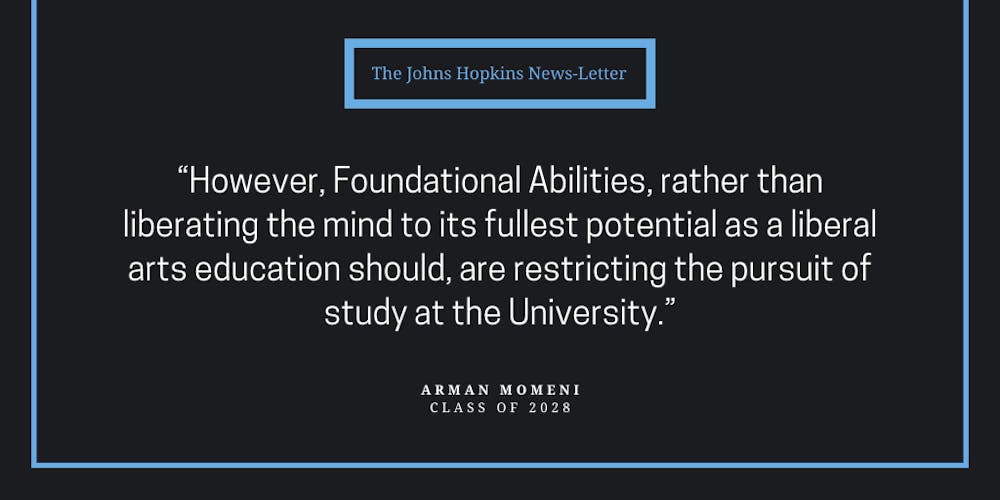What is the ultimate purpose of a university? Is it to develop individuals who are masters of a specific craft, to allow students to cultivate a broader understanding of the world by engaging in many disciplines or perhaps to achieve a balance of both?
As a student from Canada, one of my main desires for studying in the United States was its allowance for a less restrictive course of study. In Canadian high school, a diverse education was compulsory, and — while I enjoyed taking a variety of different classes, such as European history, computer science, biology or French — I wanted my post-secondary education to reflect a more liberated path of exploration.
This year, for the class of 2028 and beyond, Hopkins is instating a new graduation requirement for students in the Krieger School of Arts and Sciences: Foundational Abilities (FA), which comprise six different categories that students must fulfill credits in. The FAs require students take 15 credits in Writing and Communication, 15 credits in Science and Data, 15 credits in Culture and Aesthetics, 15 credits in Citizens and Society, 15 credits in Ethics and Foundations, and 6 credits in Projects and Methods.
According to the Office of the Provost, the undergraduate curriculum has been redesigned “to provide foundational abilities for life-long flourishing and learning.” The FAs are replacing the previous distribution requirements, which required students earn a minimum number of credits outside of their primary major in three areas comprised of the humanities (H); social and behavioral sciences (S); and natural sciences (N), quantitative and mathematical sciences (Q) and engineering (E). While these academic areas still exist, each course is now additionally tagged with one or more of the six FAs.
The University described that developing the new FAs is to ensure that students pursue an education that allows them to develop breadth as well as depth. After all, the Krieger School of Arts and Sciences is a liberal arts college, which is built on the pillars of a diverse education.
However, FAs, rather than liberating the mind to its fullest potential as a liberal arts education should, are restricting the pursuit of study at the University. Due to the limited overlap between major courses and the requirements, only a small portion of the 81 credits of FAs will be fulfilled with one’s major; FAs have become the bulk of a students’ education at Hopkins. The school seems to be placing a greater focus on breadth than depth rather than a well-maintained balance of the two.
Hopkins reports that 68% of students double major or minor; however, that percentage will certainly decrease now that students have far less space in their schedules to accommodate different subjects of choice. While breadth is incredibly important in higher-level education, it should not be costing students the opportunity to develop a thorough education in specific subjects they find interesting.
I spoke with Mihir Sharma, a freshman aspiring to double major in Molecular and Cellular Biology and Chemistry, about his perspective on the new requirements.
“I am finding it very difficult to plan out my schedule to incorporate classes from both disciplines while also trying to fulfill the minimum — yet strenuous — requirements to receive my bachelor’s degree,“ he said.
Many other prestigious universities place a premium on breadth and depth. Yale, for example, also has distribution requirements in place, requiring students take two course credits in the humanities and arts, two course credits in the sciences, two course credits in the social sciences, one course in language, two course credits in quantitative reasoning and two course credits in writing.
Yale’s distribution requirements are also split amongst six sectors, just like Hopkins. However, the required credits in those sectors are far fewer. While Yale generally requires two classes in each sector, Hopkins wants students to take almost double that at four to five classes in each category, with the exception of the Projects and Methods FA.
Compared to other top institutions, Hopkins is objectively a very rigorous and difficult school. Students here are very ambitious, taking on research projects, engaging in various clubs and starting new ventures in addition to the difficult classes they take. Adding such restrictive and exhaustive distribution requirements adds an additional task for students to manage and stress about.
Ultimately, the FAs are an important and positive addition to the University curriculum, but have been implemented too vigorously. The requirements need to be reconstructed so that they complement a comprehensive education in one subject rather than hinder the pursuit of depth. They must be structured in such a way that they free students to think about the world from a broader lens, while ultimately grounding and relating their discoveries from many disciplines to one subject that they have examined thoroughly.
Hopkins should maintain the same six FAs but require students to only take two classes in each of those disciplines. This will allow students to experience the beneficial breadth of a liberal arts education while simultaneously focusing on the core subjects that they find most captivating.
Arman Momeni is a freshman from Toronto, Canada studying Neuroscience and Applied Math and Statistics.





